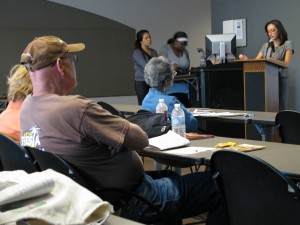As voters across the nation prepare to cast their ballots tomorrow, they are turning to a variety of sources to do their research. Members of the Osher Lifelong Learning Institute (OLLI) at California State University, Dominguez Hills were able to look to the next generation when students from Dr. Annie Wilson’s State and Local Government class presented their research last week on Propositions 19, 20, 21, 22, 23, and 25.

Pamela Prieto, a senior majoring in philosophy and political science, says this year’s issues are focused on remedies to the state’s lagging economy as well as the preservation of the natural environment for future generations.
“In tough economic times, more propositions are introduced that will generate money rather than spend money,” Prieto adds. “With time people are starting to realize that the same actions taken a few decades ago toward our environment do not necessarily work today. Legalization of marijuana and protection of the environment to some extent, reflect youth as a variable in politics.”
Joseph Villarreal, a senior majoring in political science, presented the pros and cons of Proposition 20 with his fellow students. He says that the redistricting of congressional districts is important to him because it is “vital for a healthy democracy, for it balances districts with populations that are equal in number and in interests.”
Some students changed their minds on measures after delving deeper into the issues. Villarreal says that he now thinks that “Proposition 20 wants to give too much power to a commission that has no precedent. In other words, it is an experiment and deserves a chance to prove that it works, however, not with all the kinds of electoral districts.”
Prieto says that while she relies on the General Elections Voter Guide for her information, the process of researching the background behind Proposition 21 gave her a deeper understanding of the issues regarding the proposed $18 surcharge to help fund state parks and wildlife programs.
“Proposition 21 is a very important measure on the ballot,” she says. “It has not had the same degree of attention as other propositions, because it really speaks to the economic decline in California and the consequences that come from it. Once upon a time California was known for its beauty and state parks were of an ideal quality, all of which is beginning to change drastically. There are 278 state parks in California and most are severely underfunded and have deteriorated. Generally speaking, the environment and nature – state parks and beaches included – are not the primary concern of people and/or the government, but it is important to preserve and maintain state parks and oceans for the future.”
Angelina Cisneros says that the assignment of presenting the propositions also made her go further than usual in researching her own vote for Proposition 20.
“I was intent on voting a particular way but after researching the proposition for [our] presentation I realized I wanted to change my vote,” she says. “The proposition I chose to present was important because it surrounded an issue that is important to me, gerrymandering. In addition, I applied to be a commissioner on the Redistricting Commission, the agency that would be responsible for redistricting.”
Prieto says that the measures on tomorrow’s ballot reflect the changing times, including the nation’s economic straits, attitudes toward drug use, and concern over the environment.
“As the United States becomes even more industrialized and capitalistic, there is a greater emphasis on efficiency and interests that will generate the greatest utility and ‘x’ amount of dollars,” she says. “What is needed is not always what is best. For instance, many view the possible legalization of marijuana as profitable to the state, given the amount of money it will save the general fund, and generate from the tax. However, this is not essentially the best solution to resolve the economic issues… Some may argue that legalization of marijuana and emphasis on the environment is an indicator of a more liberal society, which to an extent might be accurate, but it also corresponds to a society that is increasingly becoming more cultured and dynamic.”
For more information on the political science department at CSU Dominguez Hills, click here.